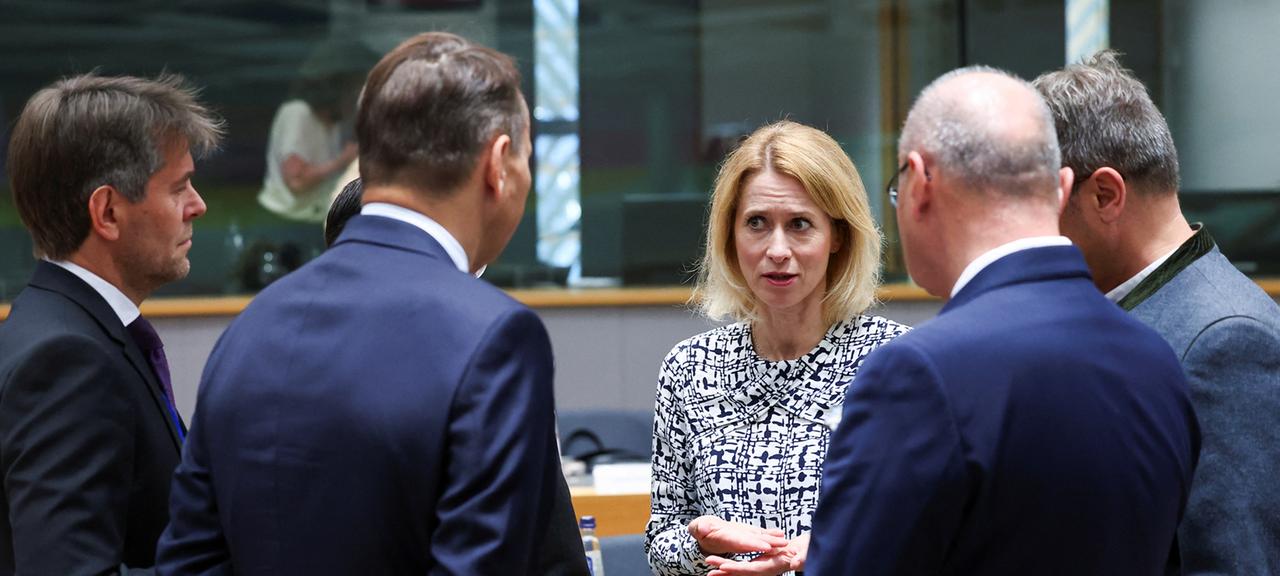
The 18th sanctions package against Russia was supposed to be adopted at the meeting of EU foreign ministers. But one country is resisting. The financing of the"Patriot" systems for Ukraine is also unclear.
Europe's foreign ministers were very close to an agreement, reported Kaja Kallas, the EU's foreign policy chief, after the negotiations. However, she was unable to announce a breakthrough."I'm really sad that we couldn't reach an agreement," Kallas said. They hadn't succeeded in convincing Slovakia.
This means that the 18th sanctions package failed in the decisive session. The new sanctions were intended to ensure that Russia would receive less revenue from oil exports to third countries than before. The plan was to impose new price caps on Russian oil and prohibit shipping companies from transporting or insuring oil from Russia at higher prices.
Slovakia wants compensation payments
Slovak Prime Minister Robert Fico had refused for weeks to agree to the new sanctions package. He intended to blackmail the EU with his rejection. He wasn't concerned about oil, but rather about compensation payments for his country in the event that a ban on Russian gas imports caused economic damage to Slovakia.
The failure of the sanctions package is also problematic from a German perspective. In addition to the sanctions on Russia's financial sector, it would have also meant the final end of the Nord Stream gas pipelines. Recently, an American investor expressed interest in taking over and repairing the gas pipelines. This caused unrest in Berlin and Brussels. There should be no going back to the past, said Ursula von der Leyen.
Not a good signal from the EU
EU foreign policy chief Kallas attempted to limit the damage after the failure, saying that negotiations would continue and that Slovakia would be brought on board. However, this could not disguise the fact that the EU was in a state of disgrace.
On the very day after US President Donald Trump's change of course, who for the first time spoke critically about the Russian President in the Oval Office, the EU cannot curb the flow of money into Vladimir Putin's war chest.
Fico maintains close ties to the Kremlin
This was prevented by Fico, a head of government who makes no secret of his closeness to Putin. At the end of last year, he traveled to Moscow and met with Putin; the two were photographed in close harmony.
The meeting caused consternation not only in the EU, but also in Ukraine. Little was revealed about the content of the talks—except that they concerned Russian gas supplies to Slovakia.
Who pays for the US air defense systems?
The question also remained open at the foreign ministers' meeting as to who, besides Germany, would accept Trump's offer to buy weapons such as the Patriot air defense systems from the US and then deliver them to Ukraine."We welcome Trump's decision to supply more weapons," said Foreign Minister Kallas,"but we would like to share the costs." However, the American president ruled that out. He approved the export, but NATO partners would have to pay.
So far, only Germany has made a firm commitment. Defense Minister Boris Pistorius announced that he would purchase two additional Patriot air defense systems from the United States to support Kyiv. The Scholz government had previously delivered three Patriot systems to Ukraine.
Denmark and the Netherlands are positive
Ukrainian military and political leaders have long pointed out that they need these weapons primarily because a computer-based radar system helps detect and intercept Russian missiles early. The cost of one of these systems, including ammunition, is estimated at around one billion dollars.
During his visit to Washington, Pistorius called on partner countries to also provide more money for such arms deliveries to Ukraine.
At the foreign ministers' meeting in Brussels, Danish Foreign Minister Lars Rasmussen declared that his country was"absolutely ready." His Dutch counterpart, Caspar Veldkamp, said they would examine how to participate in The Hague."We will examine what we can do regarding Mr. Trump's announcements and proceed from there."
Denmark and the Netherlands, along with several other countries, had already announced their participation in Patriot deliveries two years ago.

